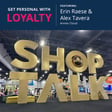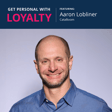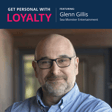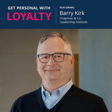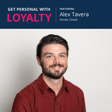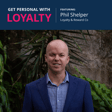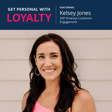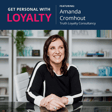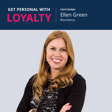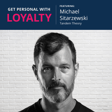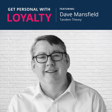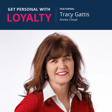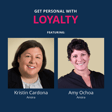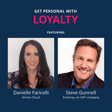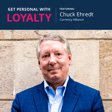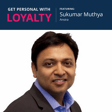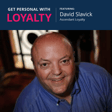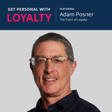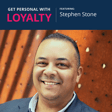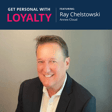Become a Creator today!Start creating today - Share your story with the world!
Start for free
00:00:00
00:00:01

Who Needs AI When You Have SaaS?
Join our host Erin Raese and Scott Shurson, Product and Solutions Director at Annex Cloud, as they delve into the evolution of customer loyalty from the early days of paper-based systems to the cutting-edge solutions at Annex Cloud. Learn how SaaS platforms enable marketers to more easily engage with their audience, the value and limitations of AI, why a custom loyalty solution may not be necessary, how to approach the build versus buy decision and how service organizations can add value and reward customers. Tune in now for an eye-opening discussion on loyalty innovation and technology.
Transcript
Introduction and Guest Background
00:00:10
Speaker
Get Personal with Loyalty, where we're discussing using loyalty to deliver personalized, relevant customer experiences. Hello, everybody. Welcome to another episode of Get Personal with Loyalty. I'm your host, Aaron Reese. And today I'm here with Scott Sherson. He is our product and solution director here at Annex Cloud. Welcome, Scott. Hi, thanks for having me.
00:00:35
Speaker
So thrilled to be chatting with you today. For those that don't know, Scott and I have been working together for years and years, it feels, at different companies. Really excited to have him here and be able to chat everything, loyalty, technology, future, everything we need to know about what's to come. So maybe we could start, Scott, sharing some of your background. How did you get started and how did you end up in loyalty?
00:00:59
Speaker
Getting started in loyalty goes all the way back to college. I started working for Carlson companies, believe it or not. Big loyalty player back in the day, founded Goldstamps and Goldpoints and all of that stuff. In Minnesota, they had a number of different programs that they operated out of three, four different buildings here. So I was in customer service. My first loyalty program was mostly paper-based and it targeted farmers, growers who were using a specific kind of product.
00:01:28
Speaker
So we would get in paper redemption forms and account merger forms and a lot of manual stuff that things that have now been completely digitized. So I worked in there. I worked in gold points. I worked in some of their travel loyalty stuff and got my first starting loyalty for a good three, four years. Made some transitions into like
Evolution of Loyalty Programs
00:01:48
Speaker
training opportunities, made some transitions into sales, engineer opportunities and found myself at AMIA.
00:01:54
Speaker
Ironically, Amy had purchased the Carlson company businesses. I found myself back in the same building I was at back in college doing all of that stuff. So that was funny. Then I was supporting a lot of the AMIA loyalty programs, which is where I met Aaron.
00:02:09
Speaker
I think I was responsible for bringing you over here to Annex Cloud too. You were, absolutely. After Amy made some transitional things that affected us both, we went out and searching and you found a couple of things and I found a couple of things. And eventually you said, Hey Scott, we found a winner here. We found an Annex Cloud.
00:02:29
Speaker
good SaaS platform and that actually does what it says that they're going to do. So I said, I don't believe it. Let me see it. And you were right. So here I am helping support things that work.
00:02:42
Speaker
Yay. Good for us and everybody, our clients, as well as Annex Cloud. Let's get into that a bit because what you hit on there is SAS technology. I love where you started and the paper version of the loyalty program. People that have listened to the podcast before know that I've been here for, in the loyalty space for a very long time. I was talking about one-on-one programs that were out before e-commerce and before email.
00:03:07
Speaker
So there's a lot of different types of technologies that are supporting loyalty, which I think is much different than in a lot of MarTech areas, or maybe just the other areas of the MarTech stack. We'd love to get your take on the space and where it's been and where it's evolving to.
00:03:28
Speaker
If you think about like early days of loyalty, the stamps, books, that kind of thing, the origination of loyalty is really that I'm giving you something in exchange for your repeat purchase, your loyalty with my organization. Once you fill it up, once you get enough for me as a brand, I will then give you something.
00:03:48
Speaker
The first digital loyalty programs were not much more than simple databases and spreadsheets that did that exact same thing. It's what was easy. I'm counting the number of things that you purchased and dollars spent, and I will then give you something for that.
00:04:05
Speaker
Now, a lot of loyalty technologies
SaaS Platforms in Loyalty Programs
00:04:07
Speaker
who are in the market supporting some of the earlier stuff or some of the easy stuff for smaller retails are not much more evolved beyond that. So some programs that come with a point of sale, programs that come with a CRM or something can't do much more than that. I get this little piece of information.
00:04:26
Speaker
How much did you purchase? What did you purchase? And I will only track that. And once you hit a certain threshold, I give you the thing, which the brand says I'm willing to give you, whether that's the free backpack or the discount or whatever. Where we saw an evolution is in companies like Aniswap who said, Hey, there's a lot more information with brands out there where they are interacting and walking with customers.
00:04:51
Speaker
talking with members and forming more of a symbiotic relationship rather than a transactional one. In this symbiotic relationship, you're finding that these brand advocates do a lot more for a brand than any other piece of marketing out there. They are old adage if I
00:05:12
Speaker
have a good experience, I tell a couple of people is extremely true, especially of your most loyal members. So annex cloud, a SAS platform is able to tap into a lot of those resources, easy integrations with just a spread of different tools that enabled this conversation and are able to look outside of buy stuff, get points kind of a relationship. So.
00:05:36
Speaker
The evolution is there and some customers are still on that journey. They're still figuring out, is it ready for us? You were just in a prospective meeting where they're still in this early journey, right? You were telling me that this brand, they are still buy stuff, get $5 off. And that's where they're comfortable being right now because it seems to be working for them. They know part of their organization knows that they need to grow and part of them is stuck in this run.
00:06:06
Speaker
if it isn't broke, don't fix it. So that's where Annex Cloud typically steps in to kind of help them to this. Now as these platforms grew and as these platforms changed, some organizations followed more of a platform as a service route.
00:06:22
Speaker
For them, it was profitable to recreate the wheel every single time. To them, it's more of a bespoke suit situation. I'm creating a new suit every time for you. And I'm proving that I have the expertise in doing that, but what you're getting is a suit that is custom tailored for you. It is still my vision. It is still my journey because I own the organization, but I'm building it absolutely new for you.
00:06:50
Speaker
That means that there are time and features, maybe you're looking in other suits, other organizations that you wish that you had, and you can get at a cost. Now a SaaS organization, the other direction, takes all of that thinking from all of these other organizations, from other engineers, from other customers, et cetera.
00:07:10
Speaker
puts it all into one basket. Am I getting the custom bespoke suit? No, I'm not. Or what I'm getting is much more than just a simple suit. I'm getting the thing, features I didn't even know that I had or features I didn't even know that I needed. It's a suit that grows with you rather than needs refitting or redoing every single time.
00:07:30
Speaker
That's where I see a lot of the evolution in loyalty is where you add in this journey and what makes more sense for you as an organization. Do I need this or do I need that? Do I need to build the scale and grow, or do I just need to execute on my vision as I saw it? It's a shift.
00:07:51
Speaker
Yeah, it's super interesting. So I think to reiterate what I think I heard is in the beginning, it's a lot of early points get something. And there's still, as far as I know, a lot of technologies out there today that are typically at a lower price point that do that and do that really well. So for an organization that just wants that basic approach,
00:08:14
Speaker
That's terrific. I think some of the things that I'm seeing when talking to organizations that are growing, evolving out of that, it is about the data, but even maybe before collecting a wealth of more data, it's just being able to maybe do some segmentation and being able to do some simple, yeah, segmentation that allows you to run some campaigns. So I know obviously you and I are different.
00:08:41
Speaker
from this male, female perspective, lots of our kids are different ages, things like that. So what's important to me now in my life is different than what's important to you with your kids going off to college where mine is already out of college, as an example. And they are beginning to see, okay, I want to speak to that person just a little bit differently than I was able to speak to them before. And I have the data and the ability to do that through my loyalty.
00:09:05
Speaker
platform or program, and now I need to be able to evolve it into a platform that allows for me to do that. And then to your point around like a platform as a service or SaaS,
00:09:18
Speaker
That's interesting too. I think a lot of people think, oh, it needs to be custom to me. I'm special. My brand is very particular, which we all agree. And I think some of the general challenges in the marketplace today is that a lot of brands have lost sight of their originality and they're getting so close to and trying to compete.
00:09:39
Speaker
with their closest competitors so much that they begin to look more similar and certainly encourage organizations to go back to their roots to think about what made them special to begin with. But that doesn't mean you necessarily need a custom platform. SaaS, I'm not sure that you mentioned this, I wanted to point this out, is it's highly configurable. So everybody does actually get a custom experience
00:10:08
Speaker
and a custom program to them through the configurations because no one configures exactly the same way and no one ultimately uses the data exactly the same way. Is that a fair statement?
00:10:22
Speaker
It is, you'll see definite differences
Utilizing Customer Data Effectively
00:10:25
Speaker
in what is good configuration in different platforms on the market. We both see in platforms where it's just like huge web forms and you have to have terminology memorized because that's how the company named the thing. Um, it is a configuration, but it's 20 steps versus an anecdote where we tried to simplify that and use standard naming conventions. You'll see that it is part of that evolution.
00:10:52
Speaker
that for segmentation, but it is still part of you on your own personal journey as a brand too. I like to say that it's, do I have the right to ask this question, even though that question is out there in the world, right? You listed our family differences in there and does a noodle shop really care about how old our kids are?
00:11:13
Speaker
Like maybe they don't, but that question could be asked a little bit differently in like a retail brand who actually is producing different sizes and different kinds of clothing for these different people. So I think using a platform allows you to grow and do I have the right to ask this question. And if I do ask this question, I should do something with it. I think a lot of people are missing that piece of it too, just because I asked the question.
00:11:38
Speaker
What am I gaining from? Because essentially in true reciprocity, if I'm giving you something, you should be giving me something back for it. And then this kind of goes to your personalization just a moment ago is if you ask me my gender, if you ask me my household size, how are you going to use that? One of our other sales engineers here tells a story about a retail brand where he purchases for himself.
00:12:05
Speaker
And he is also identifying as a he, and he gets a lot of she based marketings. He went out and he identified and they haven't done anything with it. Now this is a household brand and he's actually surprised in that. And so he uses that as a part of his demo to show the personalization and the right to ask and then doing something with it is a key component with loyalty. I think we all use that term here, show me, you know me.
00:12:32
Speaker
to say, okay, if I am going out of my way to provide you with more information, not just transactional pieces, how are you going to use that to make my experience with your brand personalized to me?
00:12:45
Speaker
Now a SaaS platform allows me to say, okay, Scott looks a lot like Jim who looks a lot like Terry. So I can simplify and make that journey pretty similar and same for them. And Erin looks like Terry and Chris in her journey is going to be the same as that. And.
00:13:03
Speaker
where Terry and Jim have ties, they can do that too. You're looking across all of the data and not just everybody like say they have personalized conversations, but in, in all reality, you are looking for trends. You are looking for things that make sense for your brand as a whole.
00:13:20
Speaker
Does the noodle shop produce different products based on your gender? Probably not. What does it matter if I ask the question, but based on your household size, Hey, we've got this family pack. Erin has listed that her kid is out of college. Probably not going to list the family packet as often, maybe around holiday times when I would assume the kid comes home. Scott's kids are not. All right. Here's the family pack. It might make more sense for you.
00:13:44
Speaker
Yeah, great point. If you're collecting the data, make sure you're using it. Don't collect it, not. And we're seeing more and more organizations do that. In fact, we've added features to our platform. We always had the ability to take surveys and enter contests and have some gamification aspects, but we've added in this concept of progressive profiling that allows you to make it more interactive. You're closer to that offering, Scott.
00:14:10
Speaker
What's going on with progressive profiling? Aggressive profiling. So I'm a brick proponent in asking an MVP, a minimum viable amount of information just to get somebody in the door. Typically customer might see a long web form with a lot of questions in it as a barrier for joining a loyalty program.
00:14:30
Speaker
I'm at the checkout. I just want to give you my email address, get it, maybe a discount, get some points and get out the door. I'm already completing this thing and I want to join the program. We're not often seeing people taking the time to sit and do a full registration for a loyalty program. It's usually coupled with some sort of event transactional or otherwise.
00:14:50
Speaker
So progressive profiling allows you to go back and incentivize somebody to give a little bit more. Again, thinking outside of the transaction, like a good SaaS platform does, you start to say, all right, if you give me a little bit more information, give me some location information, give me some family size information, I'll give you a little bit more.
00:15:11
Speaker
If you give me your size, if you give me your favorite team preference, if you give me just a little bit more, I will give you this to your point. I hope that you use it then because if I say that I like hiking, I don't want kayaks in my recommendations because I took the time to do that. I did my job. I gave you the information. Please do something with it.
00:15:35
Speaker
Members are begging for that level of personalization by filling out these surveys, by filling out the profile. They're hoping that these brands do something with it. And that's where a good staffs platform allows you to do the, and so what part of that conversation is people who have filled this out do this differently. People done this, identified that, fill that out differently.
00:15:58
Speaker
So it's where a pass or platform as a service typically would need to code up a new thing to do that. I would need to create a bespoke list using specific new queries to do that instead of just a couple of drop downs within a segment builder, like a SAS platform. So as you were talking, I was thinking about utilizing the data
00:16:25
Speaker
to personalize, but one of the reasons you want to do that is to make your customer's life easier. So if you can serve up additional content or products that could be more interesting to them, there's a higher likelihood that they will purchase, which is good for you. But it's also good for them because maybe there are items that they actually need. I'm working on a particular project in my home and I didn't think about
00:16:48
Speaker
needing caulk to go with it. They can serve that up and go, did you forget this? I looked at your basket and I knew you're working on this project. You're going to need this, which is super helpful. But then you went further. And as we're thinking about the audience that listens to the podcast, it's
00:17:04
Speaker
marketers who are actually going through this every day, thinking about how to deliver these better experiences and actually working with a system or a partner on doing this and having a SAS with just a couple of keystrokes certainly seems like it makes their life easier too. It's making everybody a bit more efficient and able to act a lot more swiftly.
00:17:28
Speaker
You're absolutely right. Marketers need to be able to respond very quickly. Things that require long coding cycles and long development cycles, they don't tell a lot of our marketers respond to events or issues with loyalty based.
00:17:44
Speaker
What we try
AI in Loyalty Programs: Finding Balance
00:17:47
Speaker
to do is empower them to pry stuff out, to take a leap and make a change, make a tweak, turn a dial, flip a lever, and get something new in that loyalty program and try it out.
00:18:00
Speaker
One of the big barriers to a lot of organizations that we initially talked with is the marketer who feels that they have to learn how to code to do things. I have to learn a programming language. I have to learn HTML. I have to learn SQL query language. I have to do all of these things where SaaS platforms typically just put that in as a field or as a dropdown to make it easy for the marketer to just respond to that.
00:18:27
Speaker
We're seeing a lot of requests for AI to do just that within the marketplace as well. So like the chat GPTs of the world, they are enabling a real language processing look into a database to, to fill a lot of this stuff out. Where a lot of past platforms that provide the service platforms, they'll give you access to a database and they'll say, okay, this is your database, have at it.
00:18:52
Speaker
So then the marketer needs to call the developer to do the query and then they'll get you the list. And then it's just like cycle back and forth. But as a marketer, if I can just say how many people have bought left-handed screwdrivers in the last month and then right-handed hammers the previous month, I can get that list back in moments with something like an AI or like a GPT.
00:19:17
Speaker
in the marketplace but like everything it comes with a certain cost there is some care and feeding to that that technology in the marketplace i also caution our marketers to not get wrapped up in buzzword bing
00:19:30
Speaker
AI is helping a lot of industries. I mean, with a database that can support this, a tool that can run the GPT software. Is that data fed from only loyalty systems or is it fed from your ERP? Is it fed from your accounting system? Where is all of that information coming from? Because oftentimes you'll find that loyalty companies like to keep only loyalty data. This is the relevant data for loyalty.
00:19:58
Speaker
Whether that is just a storage thing, or if it's something more like us, where there are a lot of legal and regulatory things that we don't want a lot of that information. I don't need your medical stuff. I don't need your credit cards. I just want to store loyalty stuff. And so that means that we are a slice of that pizza that you have to look at.
00:20:20
Speaker
But we make it easy to feed these lake houses so that these AI tools can help you create these lists very easily because that lake house is also feeding the finance team. It's also feeding the data team and security team and legal teams. It's feeding all of these other systems. I always just warn people about AI. It is not a one and done answer to all solutions. Now, platforms like ours who have robust segmentation
00:20:47
Speaker
They allow you to do a lot of that stuff, a couple of drop-downs, a couple of clicks. You can find the left-handed screwdrivers and right-handed hammer purchasers. You can do that within moments, but can I just say the words? Can I just type that out? No, because you're typically pushing against a much larger system to get that information. Interesting. So I took away two things, I think from what you just said. One, I was thinking about.
00:21:14
Speaker
the way you were explaining essentially where AI should or could live. So if I'm understanding correctly, we're getting people asking us in loyalty space, well, I want AI to do these various things. And the reality is you may not want your loyalty solution doing the AI because it doesn't essentially have enough of the data to really deliver
00:21:39
Speaker
what you really want or what you think you want and needs to be connected into another system that most likely would be doing a more comprehensive job of pulling the data.
00:21:54
Speaker
I personally think so based on right now technology. I know that it's growing and we're going to see a lot more AI adoption for like loyalty program SAS platform specifically. In fact, it's on our own roadmap. We're already looking at it and have a couple of test cases out there.
00:22:12
Speaker
But where customers like to say that they want AI is they want to set the loyalty program and just let it run. Like a fully autonomous thing. I don't even need to think about my loyalty program anymore. It's really tough because when you start putting things into robots hands, not understanding Skynet and that whole side of it.
00:22:35
Speaker
The AI might be creating campaigns and promotions and bonuses that are not necessarily financially or brand directionally appropriate for you. So I always caution about set it and forget it types of programs. The best loyalty programs are the interactive ones.
00:22:53
Speaker
The Sephora's of the world, they are flipping those dials. They are turning those wheels every single day, trying to make it better, trying to make it more personalized, trying to bring in things, trying to exit things. They're in there and they're playing with it. If you look at the top 10 loyalty programs out there, they are not set it in Brigitte kinds of things. So.
00:23:14
Speaker
If you're using loyalty as a me too, then yeah, there are technologies out there. You can set, forget it, but you will never hit that top 10. You will never hit that top 100 loyalty programs because again, you created a me too scenario where even your members will begin to forget about it. Oh, I think I've got loyalty points. So here's my phone number. Let's see what happens. More of a casino approach to it. All right. Show me the points.
00:23:40
Speaker
Versus like a true, I know I have points. I know I've got something. When I took my kid in to buy some clothes the other day to H and M, not a brand that we support yet, but I knew that we had points. I knew that there was a discount because again, I'm in loyalty.
00:23:57
Speaker
And so I was interacting with the brand. It does a good job of interacting with me and providing personalized benefits. So I interact with it and I make sure that we make those repeat purchases so that we can do this thing for myself. It's that reciprocal relationship. I gave you something, you gave me something meaningful, but it's constantly changing. It's constantly evolving. It's not just there for their sake.
00:24:22
Speaker
Yeah, that's another great point too. So to back up to more of the AI step, just because there is AI doesn't necessarily mean you should do it. And there may be other effective ways to use your current system or platform to your example of.
00:24:39
Speaker
Pulling the hammer or the screwdriver data as you said that i was like that's cool but i could do it but our system could do that it's a data point and we can search for those data points within and then that gives you more of that flexibility. Which leads to the other point you
Effective Use of Loyalty Data
00:24:55
Speaker
were making is show me you know me so how do you make it truly.
00:25:00
Speaker
interactive and it's really about the relevancy of the interactions and you do need those levers to pull. Somebody does need to be paying attention. I heard by and everybody loves Amazon, but I've yet to have Amazon get me right. And because I buy a lot of things for other people and then they keep serving this stuff up. I'm never going to buy that again. Or nothing associated with that ever again.
00:25:24
Speaker
Or in my case, I just bought this thing. You don't need to show it to me again to buy more of that. Cause I just bought it. Most of my recommendations are buy it again kind of stuff. And I don't need seven vacuum cleaners. I'm sorry.
00:25:38
Speaker
I'm not a hotel consumer. Yeah. So what other things are you hearing from people out there as far as what they're looking for? And is it really what they should be necessarily looking for or tips around features and functions that are really going to make the impact?
00:25:58
Speaker
The AHA moments for most of our conversations stem around progressive profiling, as we mentioned earlier. Things that they're buy stuff, get discount, current programs just can't do. They don't have the tools to ask these questions, whether it's a profile question, whether it's one of our new survey tools that we've introduced. They just don't have that capability to do it.
00:26:22
Speaker
They know that technology exists out there, but that's another thing that they got to build is another thing to add to the stack. Having it in an annex cloud allows them to do it all in one, which is a huge thing for a lot of our customers. So we're seeing a lot of that. Some of the other things that we still hear little snips every once in a while are things, digital coin niche and NFTs, all of these things were big a couple of years ago and.
00:26:47
Speaker
curve of interest is waning a little bit on that, but we still hear a lot of those kinds of things. Like AI, they come with care and feeding. Loyalty platforms focus on loyalty and these coins market platforms and these NFT marketplaces, they focus on those things.
00:27:05
Speaker
Though we can integrate with all of these platforms. They usually, when they build these marketplaces, they create an API structure that allows integration. So you can offer an issue on their behalf, but it's still a separate marketplace. It is still a separate thing that needs care and feeding. And FDS need to be created. They need to have blockchains formed.
00:27:27
Speaker
They need to be offered. You need to put them out there and then you need to give them to members. So what a lot of customers hoping that a loyalty platform can do is just give these things out. But if I give that to you, do you have the right kind of digital wallet to receive the reward?
00:27:44
Speaker
I was talking to somebody internally the other day, if I rewarded you with a cruise, like a, here's your cruise trip. You still have to provide all of this documentation to the cruise line. You still need your passport. You still need to get to the line.
00:28:02
Speaker
You still need X, Y, and Z and all of that stuff. Exactly. You need to do all of these things still. And these NFTs and these coins are like giving out because that's a lot of information because of regulation, because of potential fraud that you have to provide in order to make that work. Can I give you a cruise? Yes, I can give you a cruise today. I can give you a Mediterranean or Nordic cruise today. That's the easy part.
00:28:30
Speaker
Actually, the execution of the crews becomes more complicated. And that's where a lot of brands tend to fall off when it comes to it. And so then they see that, OK, yeah, NFL is not a limiting factor. A SaaS platform is not a limiter. It is the other parts of that. Some of those complexities are the reasons why these things are dropping off.
00:28:51
Speaker
Understanding the risks involved because it is an investment piece mean that they're not as cool. And I can just grab it and go. It's not like just running to the store and buying the Rolex. And I walk out the door with, if Rolex required an hour's worth of paperwork in order to walk out the door with the watch, people would be buying a lot fewer Rolexes. The same thing with like a T's. So we're seeing a drop down in that ask. It still comes up here once in a while. And we've got our due diligence, so we know how to approach it.
00:29:21
Speaker
We have a website hit to end articles about it, but again, we're not the limiter in that conversation. Other areas that we tend to get requests on are reward partnerships because a lot of customers don't have thing that they give out. So financial banks and insurance companies, I don't have a thing to give out. I am a service organization. I don't have this thing. So.
00:29:46
Speaker
They ask us for reward partnerships, but yes, we do have reward partnerships when we make it easy to do that. We also remind them that there are a lot of things that they can do that are low, no cost. So we find ourselves having to remind a lot of brands, retail and others that there are low and no cost things that you can do. You can provide education. You can give you access to things. You sponsor events because you're a bank. You can do something with that. There are a lot of things that they can do.
00:30:15
Speaker
talk about our experience, which I think builds a better bond too.
00:30:19
Speaker
Yeah, absolutely. Think about it. If us bank as a part of their card, you know, allowed you to not only maybe get a slightly better rate and a water bottle, but gave you an annual tour of the stadium. Right. That's something that's low, no cost to them to execute on that's just for loyalty members. When that would be amazing if they could do stuff like that. But I think again, they're trapped in their world and bubble of loyalty where loyalty equals dollars or swag.
00:30:51
Speaker
Yeah. And one of the things that I talk about a lot is recognition. I think recognition goes a long way too. And I'm not sure that organizations are using that in their loyalty initiatives enough. And it just could be a thank you. It could just be acknowledgement. And then it could be something far more gamified, like some kind of.
00:31:14
Speaker
badge for your avatar or something. Think of that George Clooney movie air up there, his whole like mantras, I need to hit 10 million miles. Why did he want 10 million miles? It wasn't the miles. It's what happened. Like the head of avionics would sit on a flight and have a conversation with him.
00:31:31
Speaker
He got a handwritten note from the owner. All of these things were more important to him as their most loyal member than just the miles and multipliers. So a lot of these brands need to think about, we have a lot of things, we have a lot of tools, we have a lot of capabilities that loyalty can help me execute on and identify when and who with just a couple of clicks.
00:31:55
Speaker
And then I get a personalized note from the owner. I get the head designer to do a consultation with me. I get all of these things, which are low to no cost to my organization. And it makes you feel good. So good. They built almost a whole movie around,
Build vs Buy: Custom Solutions vs SaaS
00:32:13
Speaker
but yeah. I forgot about that. That was a great example. This has been a wonderful conversation. There's one more thing I want to throw out there and this may be a bomb at the end, but.
00:32:25
Speaker
We are hearing more lately around a debate of build versus buy. And in my head, to build a whole platform, I'm going to need a number of FTEs dedicated for a certain period of time to build out certain amount of features and functions. And then as soon as they get done, maybe it's two years later, there might be four or more things or five more things that people or my marketing team is going to want in order to do it. So to me, the math.
00:32:56
Speaker
is obvious, yet it's not, it isn't for others. And I'm just curious your take on why you think organizations are still going through that debate. And maybe there's some tips around that too.
00:33:11
Speaker
Uh, build versus buy to me starts with just a fundamental organization culture. When you're talking build versus buy, you're typically talking about a group of people within your existing organization who need to justify keeping their job.
00:33:30
Speaker
By building this thing, you're saying, okay, I need to keep all of these developers around people. I don't want to lay off people. I have company picnic and softball tournaments, but I don't want to lay people off. So I need to find something for them to do. They're developers. So let's find a technical thing for them to do need to enhance the loyalty program.
00:33:49
Speaker
Let's have our development team do that. That is the first level of that is these are my people. I need to keep them around. So build versus buy isn't so much an exercise in innovation so much as it is a culture sustainment exercise, personal opinion. The next level of that is when you're paying somebody to do that, which is back to that platform as a service where they're building for, but now they have experience in building loyalty platforms.
00:34:16
Speaker
A lot of organizations start that with a, I am a unique butterfly as an organization or in my regulations, et cetera. So I need complete control over every aspect of this. I need to know the code. I need to have my hands on the code. I need all of this because I need this thing regulated.
00:34:36
Speaker
Now I've read a lot of these regulations. Hey, you've read some of them. Our security team has read a lot of these things and a lot of those regulations don't require you to actually own the code. They actually require a review of the code or something of that nature, things that we participate in, but it's about ownership at that point. I need to have it. I need to hold it. I need to be able to build on top of that.
00:35:01
Speaker
From there, it's more of the marketing team. I need to build it and it has to function this exact way. I tell the story of SaaS. As long as you don't care how to get to grandma's house, I'll get you there. That's what SaaS is. I might take the Northern route. I might take the Southern route. We might do a couple of side streets on the way, but I will get you there. That's SaaS. If you're more interested in the end point in the loyal customer, rather than the journey, a SaaS platform is going to be much better for you.
00:35:29
Speaker
So in that build versus buy story, I see that most of those people are more interested in the journey rather than the destination in that control because those controls give them an opportunity to influence it along the way, build out their dream.
00:35:46
Speaker
Whereas with a SaaS platform, it's more about the member to me and the levers and dials that enabled that conversation. Build versus buy. It really, in my humble opinion, we're seeing fewer and fewer of those, but they're still out there. They just have to have that control for whatever reason. Internally people who can give up some of that control are willing to learn how to use something new, something
00:36:13
Speaker
thought through, what they're going to get is a benefit of a lot of different programs. So you get retail and travel and food service. You get functions of those and you can make loyalty programs that have tools that nobody else has because of how you're going to use it. If another customer has that, if another engineer, if another somebody else puts that into the platform, you automatically get it.
00:36:37
Speaker
And just having that without having to think of it, now you can start to think about it and change your whole loyalty direction because of this new feature that we've just put into place. Just getting that is just mind-bottlingly amazing to me. It says that I can keep evolving my program based on a community of thought leaders rather than my own brain and the articles that I choose to read.
00:37:03
Speaker
I love it. Who needs AI when you have SAS? Something new every two weeks. I love that. I think that's a great place to, to wrap this conversation up. Scott, it's such a pleasure. Anything else that you'd like to share with the audience? Any last parting tips?
00:37:22
Speaker
Don't be afraid to get your hands dirty. Your CS teams are usually there to help you. They want to teach you. They want you to do that. It is a pleasure for them to be able to share and learn from you as well as teach you. If anything, have a conversation with your customer success team, with your customer service team about how you can do this better because I guarantee you they're waiting for you. Sometimes they've reached out to you. Sometimes they've provided you with this stuff. Read it. Talk to them.
00:37:50
Speaker
Learn how to use your platforms so that you can improve your own programs.
00:37:55
Speaker
Love it. Great way to end. And then Scott would love to allow people to get in touch with you. And one of the things I want to add with that is obviously we have a bias being annex cloud, but one of the things that I really love about you is you are very objective and you are capable of being very unbiased in your feedback and your support and understanding, okay, what is it you're trying to accomplish?
00:38:25
Speaker
if we're a great fit, terrific, but if we're not the right fit, let me point you in the direction that is. And so I think that you could be a really wonderful resource for the folks that are listening and would love for you to tell them how they can get ahold of you.
00:38:40
Speaker
Sure. As Sherson at annex cloud, I'm on LinkedIn. And if you have a program or a few program ideas, then please reach out to have that conversation. What I like to say is Erin is our dreamer and I just make sure her ideas work. Right. So a lot of my technology things are based off of conversations that we've had, right. And.
00:39:02
Speaker
your experience in loyalty and just making sure that the ideas work, that the thoughts are capable. I'm happy to talk tech, but if it is more of the program, then let's bring you and I to that conversation to kind of Batman and Robin it for you. Terrific. Let's do it. Thanks so much, Scott. Appreciate it. Thank you. Thanks for listening to this episode of Get Personal with Loyalty. Join us next time for more Loyalty Insights. Until then, dare to dream.
00:39:31
Speaker
let Annex Cloud help make your dreams a reality. Visit annexcloud.com. See you soon.
